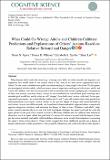What Could Go Wrong: Adults and Children Calibrate Predictions and Explanations of Others' Actions Based on Relative Reward and Danger
Author(s)
Gjata, Nensi N; Ullman, Tomer D; Spelke, Elizabeth S; Liu, Shari
DownloadPublished version (1.611Mb)
Publisher with Creative Commons License
Publisher with Creative Commons License
Creative Commons Attribution
Terms of use
Metadata
Show full item recordAbstract
When human adults make decisions (e.g., wearing a seat belt), we often consider the negative consequences that would ensue if our actions were to fail, even if we have never experienced such a failure. Do the same considerations guide our understanding of other people's decisions? In this paper, we investigated whether adults, who have many years of experience making such decisions, and 6- and 7-year-old children, who have less experience and are demonstrably worse at judging the consequences of their own actions, conceive others' actions as motivated both by reward (how good reaching one's intended goal would be), and by what we call "danger" (how badly one's action could end). In two pre-registered experiments, we tested whether adults and 6- and 7-year-old children tailor their predictions and explanations of an agent's action choices to the specific degree of danger and reward entailed by each action. Across four different tasks, we found that children and adults expected others to negatively appraise dangerous situations and minimize the danger of their actions. Children's and adults' judgments varied systematically in accord with both the degree of danger the agent faced and the value the agent placed on the goal state it aimed to achieve. However, children did not calibrate their inferences about how much an agent valued the goal state of a successful action in accord with the degree of danger the action entailed, and adults calibrated these inferences more weakly than inferences concerning the agent's future action choices. These results suggest that from childhood, people use a degree of danger and reward to make quantitative, fine-grained explanations and predictions about other people's behavior, consistent with computational models on theory of mind that contain continuous representations of other agents' action plans.
Date issued
2022-07Department
Massachusetts Institute of Technology. Department of Brain and Cognitive SciencesJournal
Cognitive Science
Publisher
Wiley
Citation
Gjata, Nensi N, Ullman, Tomer D, Spelke, Elizabeth S and Liu, Shari. 2022. "What Could Go Wrong: Adults and Children Calibrate Predictions and Explanations of Others' Actions Based on Relative Reward and Danger." Cognitive Science, 46 (7).
Version: Final published version